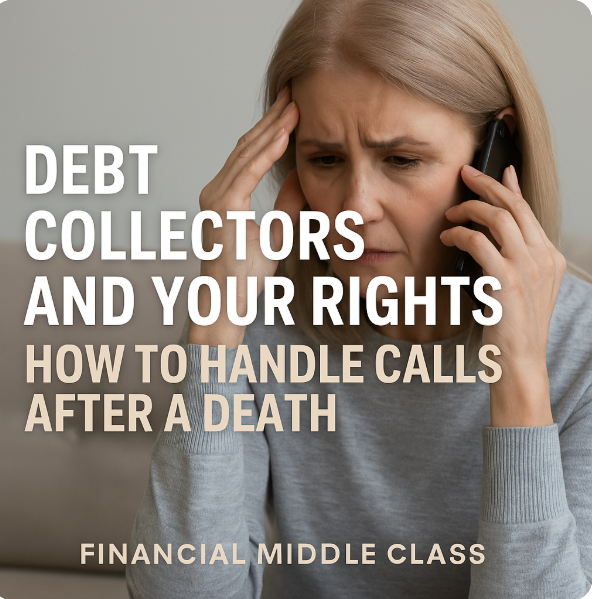Losing a loved one is one of life’s hardest experiences. Unfortunately, it’s also a time when debt collectors may start calling, demanding payment on accounts left behind. If you’re grieving, the last thing you need is harassment or confusion about what you owe.
Here’s the truth: you may not owe anything personally — but debt collectors count on your lack of knowledge. Understanding your rights can help you respond calmly, protect yourself, and focus on healing.
Why Debt Collectors Call After a Death
When someone dies, creditors have the right to try to collect unpaid debts from the estate — the assets left behind. Collectors may call family members to track down the estate’s executor or administrator.
The problem is, some debt collectors blur the line between asking for information and pressuring relatives to pay. They know you’re vulnerable, and they may use fear or guilt to get you to write a check you don’t owe.
What Debt Collectors Can and Cannot Do
The Fair Debt Collection Practices Act (FDCPA) sets clear rules.
Collectors can:
- Contact the executor or administrator of the estate.
- Call certain relatives to locate the person in charge of the estate.
- File a claim against the estate for repayment.
Collectors cannot:
- Demand payment from you if you’re not legally responsible.
- Harass, threaten, or mislead you about what you owe.
- Pretend you’ll ruin your credit if you don’t pay your loved one’s debt.
Example: If a collector calls your father’s adult daughter to demand $7,000 in credit card debt repayment, but she was never a co-signer, she owes nothing. The debt belongs to the estate, not the child.
How to Respond to Debt Collector Calls
If you get a call, here’s a simple script:
“I am not personally responsible for this debt. Please contact the estate’s executor or administrator. Do not contact me again regarding payment.”
Then hang up. You don’t need to argue.
If harassment continues, send a written cease-and-desist letter. Collectors must stop contacting you, except to confirm they won’t pursue you or to notify you of a lawsuit.
When You Might Be Responsible
There are a few exceptions where you may actually owe:
- Co-signed loans → You remain liable.
- Joint account holders → Both owners are responsible.
- Spouses in community property states → Certain debts incurred during marriage may pass to you.
Outside of these situations, the debt is not yours.
Protect Yourself and Your Family
- Ask for written proof of debt → Collectors must provide documentation.
- Don’t rush into payments → Take time to understand your legal responsibility.
- Check your state law → Community property rules vary.
- Keep records of calls and letters → Evidence matters if harassment escalates.
- Seek legal help if needed → Especially for large debts or aggressive collectors.
For more information, check official resources:
- Consumer Financial Protection Bureau (CFPB)
- Federal Trade Commission (FTC)
📌 Related Reads from Financial Middle Class:
Call to Action
Debt collectors count on confusion during grief. Don’t let them pressure you into paying what you don’t owe. Know your rights, protect your family, and explore the other guides in this series to stay financially secure.

Pingback: Who Pays a Loved One’s Debt? Myths vs. Facts
Pingback: Community Property vs. Common Law States: Marriage & Debt